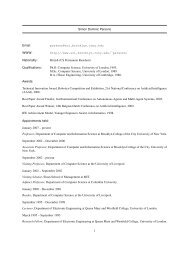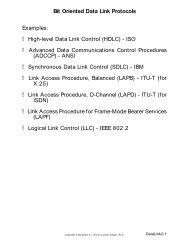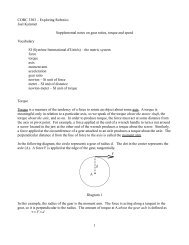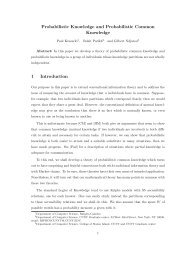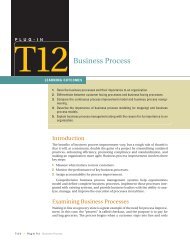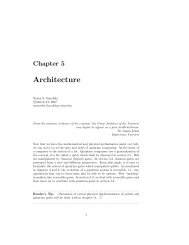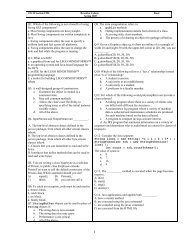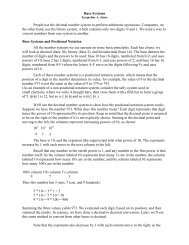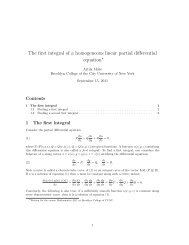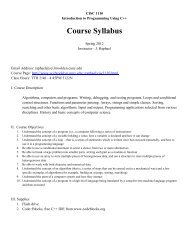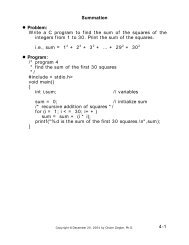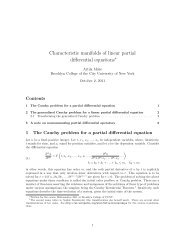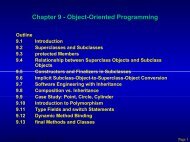*302 Greig and Others v Insole and Others 1977 G. No. 22461977 J ...
*302 Greig and Others v Insole and Others 1977 G. No. 22461977 J ...
*302 Greig and Others v Insole and Others 1977 G. No. 22461977 J ...
You also want an ePaper? Increase the reach of your titles
YUMPU automatically turns print PDFs into web optimized ePapers that Google loves.
[1978] 1 W.L.R. 302 Page 23<br />
[1978] 1 W.L.R. 302 [1978] 3 All E.R. 449 (1978) 122 S.J. 162 [1978] 1 W.L.R. 302 [1978] 3 All E.R. 449 (1978)<br />
122 S.J. 162<br />
(Cite as: [1978] 1 W.L.R. 302)<br />
will in an appropriate case readily imply such an<br />
obligation on the part of the employer, if it is satisfied<br />
that such implication is the proper way of giving<br />
to the transaction the business efficacy which<br />
both parties must have intended it should have: see,<br />
for example, Devonald v. Rosser & Sons<br />
[1906] 2 K.B. 728 . In a case where the<br />
agreement of service manifestly <strong>and</strong> on its face<br />
contains an exhaustive catalogue of all the terms<br />
that the parties have agreed upon, the court may<br />
find it impossible to make any such implication: see<br />
per Farwell L.J., at p. 745, <strong>and</strong><br />
Aspdin v. Austin (1844) 5 Q.B. 671 ,<br />
684. Save in such a case, however, the court will<br />
not be reluctant to imply an obligation binding the<br />
employer either to provide work, so as to enable the<br />
employee to perform his part of an otherwise onesided<br />
arrangement, or at least to pay him the specified<br />
remuneration so long as the employee is<br />
ready <strong>and</strong> willing to perform the services contracted<br />
for <strong>and</strong> is prevented only by the employer from performing<br />
them.<br />
These being the relevant principles, I revert<br />
to the actual terms of the players' contracts in the<br />
present case. The wording of clause 5, coupled with<br />
that of clause 6 (b), in my judgment makes it clear<br />
that the promoter is to be under no obligation in any<br />
year to arrange “tours” outside Australia <strong>and</strong> that, if<br />
he does arrange such a “tour,” he is to be obliged to<br />
pay the player merely pro rata for the number of actual<br />
“play days” in such “tour,” according to the<br />
formula set out in clause 6 (b). In these circumstances<br />
there is in my judgment no room for any<br />
implication of terms in regard to “tours” outside<br />
Australia. The position in regard to “tours” in Australia<br />
seems to me quite different. Under clause 6<br />
(a) of Mr. <strong>Greig</strong>'s contract, the player is to be remunerated<br />
for his participation in each “tour” in Australia<br />
by way of a fixed stated sum, which is to be<br />
paid as to a stated part of the date of the contract, as<br />
to a further stated part “following the completion of<br />
the third test match or on January 5 in that season<br />
(whichever shall be earlier) <strong>and</strong> as to $10,000 on<br />
completion of the tour.” Clause 6 (a) states the “day<br />
rate” of remuneration, but the sub-clause is so drafted<br />
that even if, in the event, a “tour” in Australia<br />
arranged by the promoter is less than 55 days, a<br />
player, who has participated in the “tour” <strong>and</strong> otherwise<br />
performed his part of the contract, is entitled<br />
to the total agreed fee in respect of that “tour,”<br />
without any pro rata reduction. In these circumstances,<br />
in my judgment the clear inference is that<br />
if, during the term of such contract, whereby the<br />
promoter was expressed to “engage the player to<br />
provide his services,” the promoter in any year<br />
failed to arrange any “tour” in Australia, a player,<br />
who demonstrated his willingness to play on such a<br />
“tour” if arranged <strong>and</strong> had otherwise observed his<br />
part of the contract, would be entitled to the full<br />
“tour” fee. Such implication is in my judgment the<br />
only way of giving reasonable effect to the presumed<br />
intention of the parties, particularly<br />
*327 when the restrictions imposed on this<br />
player by clause 3 (b) for the term of the contract<br />
are taken into account.<br />
I therefore reject the defendants' submission that<br />
the players' contracts are void, either on the ground<br />
of public policy or on any other grounds. I should<br />
perhaps add that the defences in the two actions add<br />
a plea that such contracts are unenforceable. Of the<br />
50 or so players who had entered into such contracts<br />
by the time that proceedings were begun,<br />
some (such as Mr. Procter) did not receive legal advice<br />
on them <strong>and</strong> most, if not all, were not immediately<br />
supplied with copies for them to retain. It may<br />
be — I put it no higher — that, on these or other<br />
grounds, some individual players would in the particular<br />
circumstances of their respective cases have<br />
the right to rescind their contracts as against World<br />
Series Cricket. For present purposes it will suffice<br />
to say that no attempt was made on behalf of the<br />
defendants, either by adduction of evidence or otherwise,<br />
to show that the contracts were all voidable<br />
by the players on the grounds of misrepresentation,<br />
undue influence, unconscionable bargain or similar<br />
grounds. In this context the only submission put<br />
forward was that they were wholly void, on the<br />
grounds which I have considered <strong>and</strong> rejected.<br />
© 2011 Thomson Reuters.



